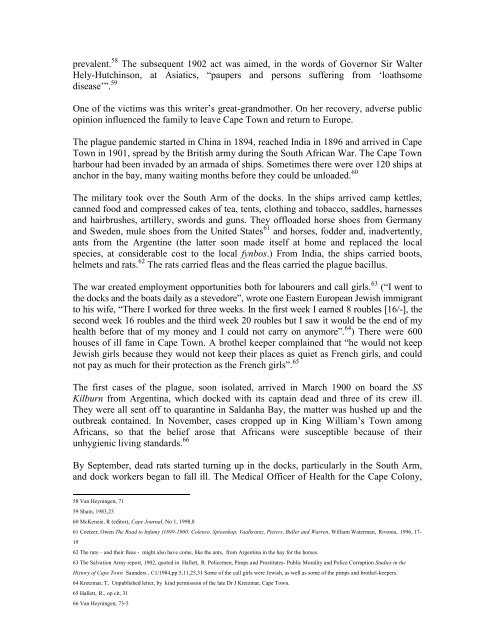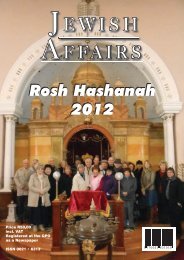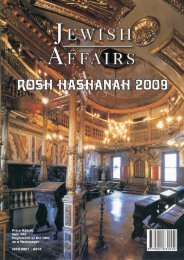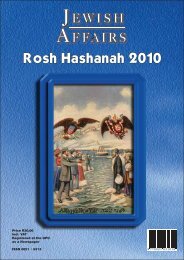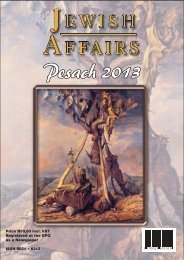ja chank 2008 - South African Jewish Board of Deputies
ja chank 2008 - South African Jewish Board of Deputies
ja chank 2008 - South African Jewish Board of Deputies
You also want an ePaper? Increase the reach of your titles
YUMPU automatically turns print PDFs into web optimized ePapers that Google loves.
prevalent. 58 The subsequent 1902 act was aimed, in the words <strong>of</strong> Governor Sir Walter<br />
Hely-Hutchinson, at Asiatics, “paupers and persons suffering from ‘loathsome<br />
disease’”. 59<br />
One <strong>of</strong> the victims was this writer’s great-grandmother. On her recovery, adverse public<br />
opinion influenced the family to leave Cape Town and return to Europe.<br />
The plague pandemic started in China in 1894, reached India in 1896 and arrived in Cape<br />
Town in 1901, spread by the British army during the <strong>South</strong> <strong>African</strong> War. The Cape Town<br />
harbour had been invaded by an armada <strong>of</strong> ships. Sometimes there were over 120 ships at<br />
anchor in the bay, many waiting months before they could be unloaded. 60<br />
The military took over the <strong>South</strong> Arm <strong>of</strong> the docks. In the ships arrived camp kettles,<br />
canned food and compressed cakes <strong>of</strong> tea, tents, clothing and tobacco, saddles, harnesses<br />
and hairbrushes, artillery, swords and guns. They <strong>of</strong>floaded horse shoes from Germany<br />
and Sweden, mule shoes from the United States 61 and horses, fodder and, inadvertently,<br />
ants from the Argentine (the latter soon made itself at home and replaced the local<br />
species, at considerable cost to the local fynbos.) From India, the ships carried boots,<br />
helmets and rats. 62 The rats carried fleas and the fleas carried the plague bacillus.<br />
The war created employment opportunities both for labourers and call girls. 63 (“I went to<br />
the docks and the boats daily as a stevedore”, wrote one Eastern European <strong>Jewish</strong> immigrant<br />
to his wife, “There I worked for three weeks. In the first week I earned 8 roubles [16/-], the<br />
second week 16 roubles and the third week 20 roubles but I saw it would be the end <strong>of</strong> my<br />
health before that <strong>of</strong> my money and I could not carry on anymore”. 64 ) There were 600<br />
houses <strong>of</strong> ill fame in Cape Town. A brothel keeper complained that “he would not keep<br />
<strong>Jewish</strong> girls because they would not keep their places as quiet as French girls, and could<br />
not pay as much for their protection as the French girls”. 65<br />
The first cases <strong>of</strong> the plague, soon isolated, arrived in March 1900 on board the SS<br />
Kilburn from Argentina, which docked with its captain dead and three <strong>of</strong> its crew ill.<br />
They were all sent <strong>of</strong>f to quarantine in Saldanha Bay, the matter was hushed up and the<br />
outbreak contained. In November, cases cropped up in King William’s Town among<br />
<strong>African</strong>s, so that the belief arose that <strong>African</strong>s were susceptible because <strong>of</strong> their<br />
unhygienic living standards. 66<br />
By September, dead rats started turning up in the docks, particularly in the <strong>South</strong> Arm,<br />
and dock workers began to fall ill. The Medical Officer <strong>of</strong> Health for the Cape Colony,<br />
58 Van Heyningen, 71<br />
59 Shain, 1983,23<br />
60 McKenzie, R (editor), Cape Journal, No 1, 1998,8<br />
61 Coetzer, Owen The Road to Infamy (1899-1900: Colenso, Spioenkop, Vaalkrantz, Pieters, Buller and Warren, William Waterman, Rivonia, 1996, 17-<br />
19<br />
62 The rats – and their fleas - might also have come, like the ants, from Argentina in the hay for the horses.<br />
63 The Salvation Army report, 1902, quoted in Hallett, R. Policemen, Pimps and Prostitutes- Public Morality and Police Corruption Studies in the<br />
History <strong>of</strong> Cape Town Saunders , C1/1984,pp 5,11,25,31 Some <strong>of</strong> the call girls were <strong>Jewish</strong>, as well as some <strong>of</strong> the pimps and brothel-keepers.<br />
64 Kretzmar, T, Unpublished letter, by kind permission <strong>of</strong> the late Dr J Kretzmar, Cape Town.<br />
65 Hallett, R., op cit, 31<br />
66 Van Heyningen, 73-5


